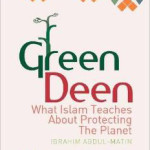Reading Green Deen not only awakens our sensitivity to our usage of water, watts and food, but also makes us reflect on how we as individuals are treating the environment”the earth, the animals, birds, trees—and our own consumption choices
Green Deen”What Islam Teaches About Protecting The Planet
By Ibrahim Abdul Matin
Published by: Kube Publishing Ltd, Markfield, Leicestershire, UK
Email: [email protected]
Pages: 236 pages
Year: 2012
ISBN: 978-1847740403
Reviewed by: Nigar Ataulla
Muslims praise their Creator, pray, fast and give charity. All of these are, as is well-known, stressed in Islam. But what is not as widely-known as it should be is that there are deep connections between Islamic teachings and environmental protection. Concern for the environment is not just a modern concern. Drawing on Islamic sources and interviews with Muslim environmental activists, this path-breaking book highlights Islam’s profound dedication to humankind’s collective role as stewards of the Earth. It offers dozens of examples of how Muslims can follow a ‘green’ understanding of the Deen’, an environmentally-friendly understanding of Islam.
Author Abdul Matin is a well-known environmental activist. He spearheads the Green Deen Movement, established the Brooklyn Academy of Science and Environment in the USA, and was instrumental in the national ‘Green Jobs Now’ campaign. He is a policy advisor in the New York City Mayor’s Office on issues of long term planning and sustainability.
In his foreword, US Congressman Keith Ellison states that “Green Deen brings faith communities into the environmental movement by changing the conversation from the facts of global warming to the fact that we all live and work here together and have a collective responsibility to keep this place clean and safe for everyone. Ibrahim Abdul Matin is a man of faith, as many Americans are. In Green Deen, he talks to Muslims, Christians, Jews, Hindus, Buddhists, environmentalists and many others.”
The book is divided into four parts, each dealing with one of today’s major environmental problems: waste, watts (energy) water and food. Each section presents the problem, offers solutions in the form of individual stories of Muslims who are living a ‘green’ approach to the Deen and includes verses from the Quran and Hadith that support this environmentally-sound approach understanding of Islam. The core purpose of the book is to help build a movement that brings together spiritual practices with protection of the environment, which the author recognizes is not possible without a reversal of over-consumption and our fixation with “things,” which generate a system of waste and toxicity that is devastating the planet.
“I am a foodie,” confesses Abdul Matin in the chapter on “Food”, adding “It is often said, ‘You are what you eat’, which implies that the cleaner, healthier and more natural your food, the cleaner, healthier and natural you are”. He narrates a fascinating breakfast interview with Qaid Hassan, a vegetarian who operates a farmer’s market in Chicago and who stresses that, “vegetarian eating really allows us to know more about the land and the food. A diet heavy in meat goes against the principle of living in balance with nature (mizan). Getting meat and poultry to our plates requires so much energy that is not really returned to the Earth. Muslims need to consume more fruits and vegetables!”
In the last few chapters, Abdul Matin takes us through the journey of halal meat, giving examples from Prophet Muhammad’s (pbuh) guidance on treating animals with kindness and respect.
Abdul Matin deserves our heart-felt congratulations for seeking to reach out to Muslims, and people of other faiths too, to realise that protecting the planet is deeply embedded in the Muslim tradition from a variety of perspectives. As a collection of thoughts, stories, analyses and practical bits of advice to help anyone looking to further their ‘green’ understanding of the Deen, this book is a treasure. It is a very useful tool for those seeking to live out their faith in a manner that takes into account the Islamic mandate of care for the environment.
This is no mere academic treatise. It is a passionate appeal for us to recognize our religious responsibility of taking care of the planet that we inhabit. Reading Green Deen not only awakens our sensitivity to our usage of water, watts and food, but also makes us reflect on how we as individuals are treating the environment”the earth, the animals, birds, trees—and our own consumption choices, all of which have consequences for the environment.


COMMENTS